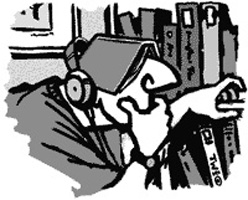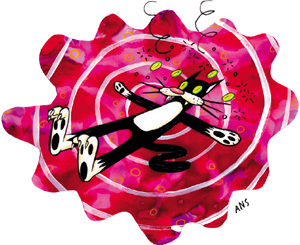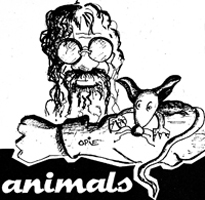 Psychopharmacology, Audiobooks, and the Possession of Literature
Psychopharmacology, Audiobooks, and the Possession of Literature
by Dave Liljengren
illustration by Timothy Walker
“Possession is nine-tenths of literature,” my cousin once said, his tongue firmly holding title to cheek. I knew he was only satirizing a maxim of real estate law, but I followed his counsel anyway, filling bookshelves with celebrated tomes, hoping book ownership alone would educate me.
Not surprisingly, this didn’t happen. Contrary to the hopes of lackluster students worldwide, education by osmosis eludes humankind still. I hoped my possession scheme would lead me to picking up a solid read and venturing in of my own volition whenever I had a spare moment. This too came to naught.
A lack of in-house reading material is never the only impediment to those who claim they’re too busy to read. With me and my excuse-making ilk, there’s always more – usually it’s cognitive laziness – below the surface, stopping self-education.
That said, I admit I’ve owned four copies of John Kennedy Toole’s A Confederacy of Dunces, while struggling to solve the equation regarding possession and literature. If you agree with my cousin’s maxim, you would think me a Dunces expert. I purchased each copy intending to read every word. “How could I have missed out on this gem for so long?” I would ask, only half joking, when standing in the booksellers line, counting George Washingtons for another paperback Dunces with bright orange border and a caricature of Ignatius J. Reilly, the novel’s main character, on the cover.
I knew Toole, the book’s New Orleans-based author, killed himself with Dunces still unpublished. His grieving mother, desperate to validate her son’s labors, sought Louisiana author, Walker Percy’s opinion of the book. The eminent Percy recognized the novel’s worth and urged publication. Such pathos, combined with umpteen friendly recommendations, drew me to Dunces.
But when my eyes did the walking, I never got past the opening scene. This is where oafish Ignatius is nearly arrested while waiting for his mother at the department store. It was too easy, I thought, to make fun of overly assiduous police and adult men living with their mothers. I was approaching 30 then and taking three squares a day in my father’s house. Toole understood me too well. He was lampooning skittish, self-pitying, boomerang offspring like myself, but I was fitted with ego blinders. I assigned fault to the book, not to my lack of ambition, or my pervasive body odor.
Down the book went, after the first few pages, and there it stayed, every time. I would pick it up, I told myself, if there was nothing else to read.
The work was then forgotten. When friends talked of Dunces, I would grudgingly regain interest and, my previous copy lost by then, purchase another.
Despite such multiple purchases, I still haven’t read Dunces. Yet, through the miracle of books on tape, I can recommend it to you. I know what’s inside. I just haven’t run my eyes over each page.
There’s a story here. At least one. My per-usual laziness was compounded recently by drug-mandated leisure. Drugs, prescribed ones, have kept me from concentrating. Without powers of concentration, I find myself, like Ignatius at Dunces‘ beginning, unemployed.
Diagnosed with bi-polar affective disorder last February, I’ve been socked in by stabilizing medications in the name of treatment. These, the straitjackets of the managed care asylum, keep me from soaring headfirst through manic highs, an arcing cruise missile with fantasies of Godlike power and delusions of limitless funds spendable on everything in sight. They also keep me from the gutter-level low inevitably following, where I despise myself and refuse to lift my head. Though the drugs are miraculously quieting, they do severely decrease concentration and memory. Psychopharmacological success has come at the price of heavy sedation and at the cost of pleasure reading.
My free time, however, has not been completely devoid of literature. I’ve found I can concentrate when listening to books on tape. For this discovery I thank the audio version of Dunces. Aware I’d never read the conventional text, I bought the tapes hoping a sonic one would download easier. It did.
Taped,Dunces quickly passed the prefatory scene I found so unbelievable, careening from there to the rollercoaster plot’s inspired rascality.
So this time, the book and I connected, and I must say, it’s quite funny. Written and set in the self-important sixties,Dunces sparkles with ebullient characters. Toole glides through mirthful collisions of old and new New Orleans, mother and son, working class and academia. It’s a good listen, or for traditionalists, a good read. Had I not lost the ability to read entirely, I wouldn’t have been able to overcome my prejudices and enjoy this work. I would have missed out on one of the few pieces of Americana from that dreadful, Deadhead-full decade still improving with age.
Dunces ignited a listening renaissance for me. Conveniently, I was able to find product in just about every large bookstore in which I looked. I’m not alone in pursuit of the aural tradition. Audio sections compete with magazine racks, recent history’s other boom for the bookish, for control of the seller’s display space. Popular audio editions are frequently out of stock. A full-fledged oral resurgence is in the offing, sparked by laziness and long commutes. If present trends continue, spoken anthologies may outsell Prozac by the turn of the millennium.
After many taped books, I’ve isolated a qualitative hierarchy. There are a successful few where the authorial spirit leaps from the voice of the reader. In these the novel is brought alive. But not all is quality in the literary sound garden. There are those tapes with mechanically recited text. Regardless of the writing’s quality, such readers leave the corpus dead on the page and the unfortunate listeners rooting around for something else to occupy them.
For a book to seem real, the voices written there – narrator, characters, etc. – must be consistent and believable. By extension, for a book to work well when read aloud, it must first be a good read in those terms. A shoddily written book can’t be made good no matter who’s reading it, but a well-written book gets an extra push and can have a second life as spoken word.
Just as a harpsichordist can summon Bach fugues from mere bars on a photocopied score, a reader, when gifted with a writer’s ear, can recreate the hums and clicks of authenticity the author intends to sound in the heads of individual readers as they enjoy the work. Readers less sensitive to style, on the other lobe, tend to miss tempo and pitch changes, treadmilling through page after page in the same colorless way our harpsichordist might grind out chromatic scales in the practice room. Such finger exercises never summon the magic of the Leipzig keyboardist or even attempt it. Via loose analogy, low-passion readers, masters only of the laundry list, deliver mere page content, the bare necessities, and have talents better suited to updating Weather Channel forecasts.
The animated reader performing Dunces on the Dove Audio Books recording that introduced me to the artform is Arte Johnson, the otherwise lumpen comic who wore a Nazi helmet and ponderously said, “Very interesting,” on the sixties television variety show,Laugh-In. Sympatico with Toole’s broad brush humor, Johnson excels at creating distinct voices for each character. An unironic bellow personifies the novel’s main character, Ignatius J. Reilly, a deluded buffoon full of sloth, arrogance, and William F. Buckley’s vocabulary. In other dialogue, Johnson modulates his voice and intonation in a way suggestive of women’s voices. For instance, Ignatius’s long-suffering mother, a simple soul eventually driven to hysteria, comes alive when Johnson wraps his impressionist voicebox around her dialogue. Each female character is developed to a similar level of uniqueness. Such marks Johnson’s readerly greatness. No matter who the reader is, what their gender is, or to what level their dramatic skills have risen, cross-gender voice characterizations can trip them up.
Darren McGavin, one time star of TV’s Kolchak: The Night Stalker, and generally, to my lolivian theatrical tastes, a nifty B-grade actor in male roles, uses aswishy falsetto when reading quotes from hard-boiled female characters in his numerous taped readings of the works of John D. McDonald. Unintentional farce ensues.
A Budweiser-shilling hero of mine, Charlton Heston, reads Ernest Hemingway’s The Old Man and the Sea, a book with no female characters, and struggles even so. Heston’s pheromonal rumble overpowers even Hemingway’s pheromonal work. Misunderstanding the dark simplicity of the text and the restrained role required of his performance, Heston hams in a way that requires he, Charlton Heston, famous actor, remain the center of the listener’s attention.
Heston delivers the frail old man’s internal dialogue with the force of a lawgiving Moses while intoning the old man’s outward frettings with the strutting sci-fi sanctimony of Taylor, a character in a movie where Heston played the only talking human on a planet of costumed apes. Hemingway’s unlucky old man dies like a spark under a wet blanket as Heston reprises his film career in soliloquy.
It is perhaps also true that Heston, at times a right wing-ish political activist, is only comfortable under the skin of meaty characters intent on changing the world. Because of this, it is curious Heston chose a story as focused as The Old Man to record, instead of say,Moby Dick, a grander classic of fish and man. As a result, despite uneclipsable star power in the reader, Heston’s Hemingway overloads the material and doesn’t come close to Johnson’s Toole, either in its efficacy as a spirited entertainment product or in its accuracy as a spiritual representation of the novel.
Books read aloud, like any dramatic work, stand or fall on the strength of casting, and the results are not always predicated on the success of the reader’s acting career. Quality book performances come from uncelebrated sources, and bad ones can originate on filmdom’s Mount Olympus. Forget Academy Award winners who huff and puff pompously when, given the chance, a low-budget sketch actor who, gifted with the right mix of dramatic alacrity, kitschy comic vocals, and character integrity, will often do a better job.
Stories have a life of their own, and their tellers, if they are to succeed, must respect the vitality of the voices within them. Small, understated stories can possess the lifeforce to persist indefinitely. This became clear to me in a chance encounter with Charles Laughton. An Academy Award-winning actor best known for his role as Captain Bligh in Mutiny On the Bounty, Laughton made his post-film career living through a touring act. This consisted of dramatic readings before an audience of selections from the Bible, Jack Kerouac, Shakespeare, George Bernard Shaw, and experiences from his own life, among other things. This phase of his career was recorded in a two-record set called Charles Laughton: The Storyteller.
In one story Laughton recalls a trip to Paris’s Notre Dame Cathedral when he was a student traveling Europe during a term break. Fascinated by the stained glass work of the famous church, Laughton admired a certain window for a long time, and then turned to ask someone nearby if he knew the century in which the work was built. The person asked, a man who appeared old to Laughton, was impressed by the student’s sincere curiosity and brightened. Laughton had been scheduled to leave Paris that day and continue his trip southward.
However, the old man, who described himself as the person whose job it is to make sure that all comers comprehend the cathedral’s beauty, took to educating Laughton. The two spent three days together in which Laughton was intensively educated about the history of every facet of Notre Dame and its art.
Laughton left Paris, finished college, and began his stage career. Over the years, Laughton longed to return, but, busy with his career, was only able to do so after 20 years. When he arrived, he found the old man, quite frail but still alive and still teaching visitors. When Laughton approached him, the man said, “Where have you been the last twenty years?”
Not many years later, Laughton found out that the old man had died. He continued telling the story of the old man until his own death, and the power in this simple story of mentoring and reunion reaches out to me even now.
And this, I would posit, is what can be meant by the possession of literature. Books may be purchased as consumer items and never interacted with – after four copies of A Confederacy of Dunces, I understand this well – but literature is the essence we take with us after the book is closed. The literature of Charles Laughton must have consisted of the stories of the man in Paris and the works of artists like Shakespeare and Shaw that he performed. My own literature holds, among other inspired moments, John Kennedy Toole and the story of his untimely passing, his blundering character Ignatius, Hemingway’s old man and the big fish, Laughton reading Kerouac, Laughton and the old man, etc….
These stories, literary snippets, have become possessions of mine because they are all inside me, crisp, orange sparks of hope in a big darkness. I remember them and have been sustained by them when no other story, not even one recalled from my own life, could. They are there, not just nine-tenths of the time, but ten-tenths of the time, in ten-tenths of the ways literature can be possessed. And that’s all that matters. Any other concept of ownership is mere consumerism.



